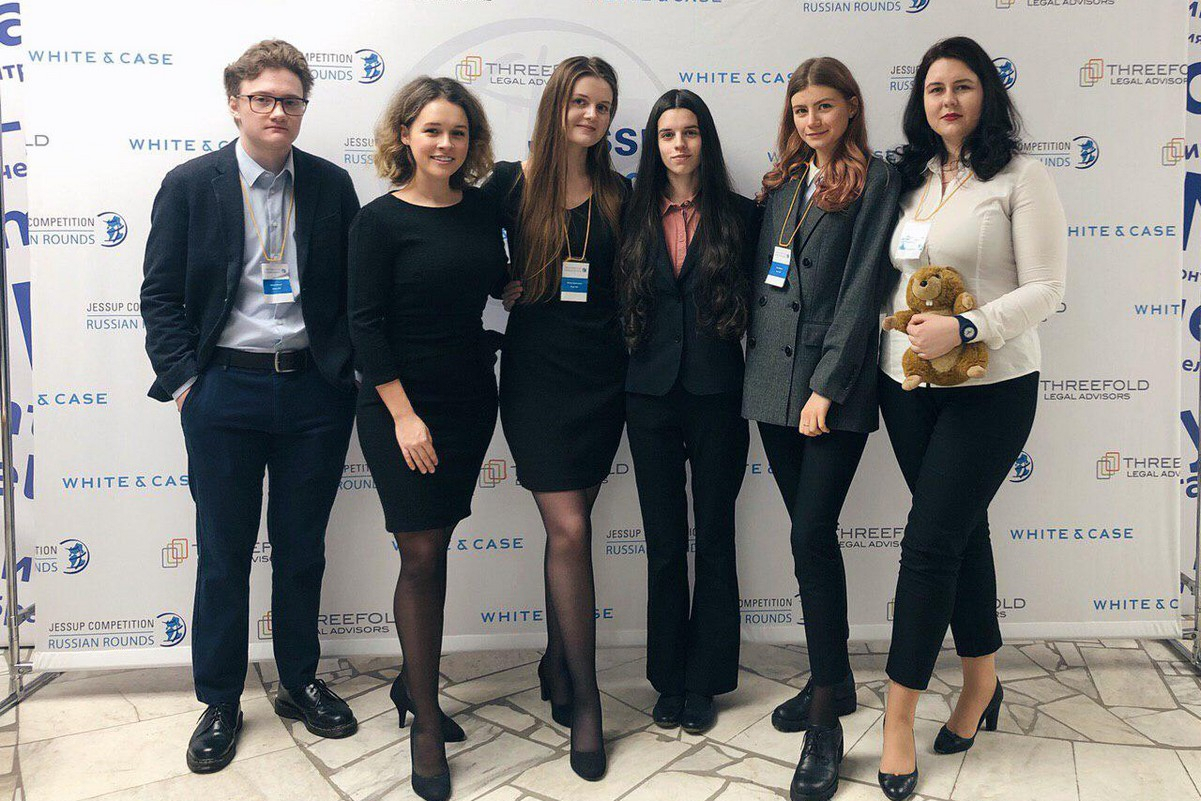Law students to represent St Petersburg University at a competition in Washington

The team of St Petersburg University has become a bronze winner of the Russian championship of The Philip C. Jessup International Law Moot Court Competition. Students will continue to compete for victory at the tournament in the USA.
The national rounds were held in Moscow. The bachelor’s and master’s students from St Petersburg University who took part were: Elizaveta Vasileva, Marina Shelomova, Anastasiia Krus, Alisa Shilova, Kseniia Rud, and Nikita Gaevoi. They competed with thirty teams from the leading Russian universities. The students were judged by the partners and lawyers from the major law firms, large Russian companies, lawyers of the UN International Court of Justice, European Court of Human Rights, International Criminal Court and other international judiciary, as well as teachers from the key Russian and foreign universities.
The students pointed out that preparation for competitions required a maximum level of effort. A participant of the university team Elizaveta Vasileva said that there were four months between the publication of the case and the national rounds of competitions. ‘It is not as long as it seemed in the beginning. It is important to capture the moment when all the endless discussions and contemplations must finally begin to take the shape of memorandums and speeches of presentations.’
The competition is held in the form of a mock trial and it simulates International Court of Justice procedure. Today, the Jussop competition is the biggest and most famous student moot court competition in the World. Every year 2000 students from more than 90 countries take part in it.
The theme of the Jussop competition 2020 was dedicated to the questions of: the simultaneous litigation of an international dispute by various judicial bodies; responsibility of heads of states for war crimes; and also killer robots. According to the participants, as usual there was not one correct solution to all the key questions of the case. The answers were deduced from fundamental legal principles, and did not lie only in the sphere of traditional law.
This year’s case contained a great number of controversial issues of international public law: the problem of using autonomous weapons and trade law. It was rather interesting, but at the same time searching for and systematisation of information required a lot of effort.
Member of the team, Nikita Gaevoi
Both the judges and the organisers of the Jussop competition stated that the teams had a very high level of expertise in the Russian national rounds. ‘It definitely has a huge advantage: each round turns into a fascinating mini-contest, where the opponents show the results of their research and set them against your findings,’ said Marina Shelomova.
She took the ninth place in the rating of the best speakers of the competition. These skills are evaluated by several criteria: knowledge of the materials of the case; level of knowledge of the law not only in the sphere of the questions relevant for the case, but also in the field of international law in general; the quality of the answers to the questions of the judges; ability to successfully fend off arguments of the opponents; and time management skills.
‘Getting ready for oral presentations is probably the most tense part of the preparation for the competition. Not only do you have to remember the argumentative structure of your position, but you must also keep in mind its weaknesses. These will inevitably raise questions of the judges, and can easily be attacked by the opponents,’ explained Marina Shelomova as she shared her impressions of the competitions. She said that while giving the presentation it is necessary to remember its main aim which is to persuade the judges. So, you have to try to keep the discussion under control, and not let it go in the wrong direction.
According to Marina Shelomova, although there were only two participants who gave speeches, they represented the work of the whole team. Without the contribution of each member into the research of certain legal issues, without the support and constant help during preparation of the material, it would be impossible to achieve even interim success.
100
teams from all over the World – the best of the best – will take part in the international rounds of the Philip Jussop International Law Moot Court Competition in Washington in April, 2020.
It is a serious challenge; therefore, the students allow themselves only a few days of rest before the new training course. ‘Today we see the areas of public-speaking and argumentation we should develop. The following two months will be very tough, but also interesting,’ Marina Shelomova said.
Teachers of St Petersburg University, Dmitrii Bartenev and Ksenia Shestakova, helped the team prepare for the competition.

